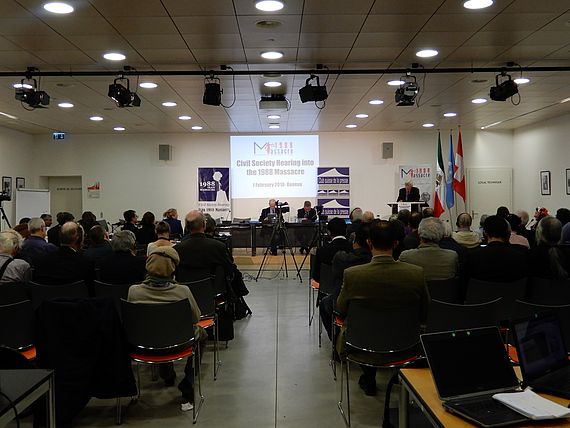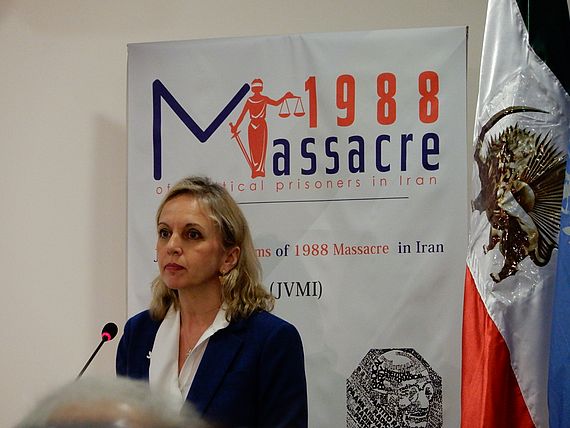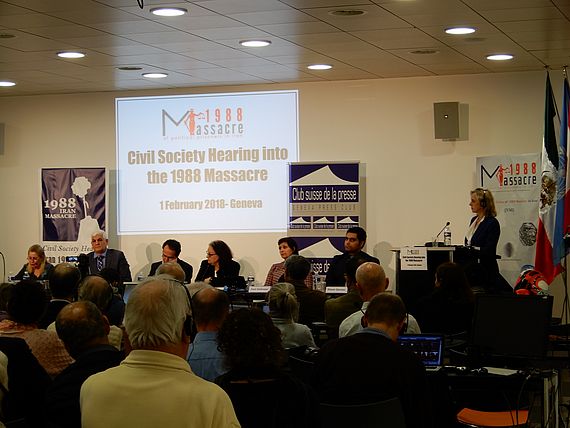Civil Society Hearing into the 1988 Massacre of Political Prisoners in Iran
On February 1, 2018, a conference took place in Geneva —the European headquarters of the United Nations— with the participation of a number of NGOs holding the UN’s advisory rank.
In this conference, the most prominent international advocates, former political prisoners, wit-nesses, and the families of the martyrs of the 1988 political-prisoners-massacre participated. The lawyers and other participants all stressed the necessity of an investigation of the regime’s crimes and bringing the ones responsible to justice. The participants of this conference also asked for the prosecution of the ones accountable for the killing and suppression of the protest-ers at the end of 2017 and demanded the freedom of all those who were arrested. Many of the perpetrators of the massacre of 1988 are still in charge and took part in the suppression of the above-mentioned protests. In support of the victims’ rights and those arrested in the large-scale protests in Iran at the end of 2017, the Welle association sponsored the conference. In this ses-sion, a number of family members of the martyrs of the 1988 massacre testified.
Tahar Boumedra, the former Head of the Human Rights office on the United Nations in Iraq, referred to continuing inaction in regards to the massacre of 1988 and emphasized that “the re-gime’s crimes against the protesters in January 2018 is an evidence of this fact.”
Kirsty Brimelow,QC, a UK prominent lawyer, and Chair of the Bar of the Human Rights Com-mittee of Lawyers Association of England and Wales, presented her indictment against the per-petrators of this crime on behalf of all the victims of 1988 massacre and their families. On the grounds of Khomeini’s criminal fatwa, Montazeri’s letters, the tape of the meeting of Montazeri with four of the perpetrators and the confessions of the heads of the regime, Ms. Brimelow con-cluded that what happened in 1988 is indeed an example of a crime against humanity. She pointed out that taken into account that these perpetrators are still in high ranking positions of the ayatollah’s regime, the crimes of 1988 have continued to this day in Iran.
Kirsty Brimelow pointed out the large-scale arrests during the recentuprising of Iranian people and the killing of a number of protesters in prison accentuated the importance of ending the im-punityof the ones responsible for these crimes. She further demanded an international investiga-tion to bring all the perpetrators of these crimes to an international court of law.
In this conference, a number of witnesses of the 1988 massacre testified:
Mostafa Naderi, a former political prisoner and witness to the 1988 massacre, said, “As I had heard from other fellow prisoners, in all the cells of Evin prison, there used to be 12,000 prisoners of which only 250 survived.”
Yahya Shojai said, “My daughter, Nasrin, was executed in this massacre. Mynephew, called Ghorban, was imprisoned and his sentence was already over and he was supposed to be re-leased. But not only he was not released, he was also executed.”
Sima Mirzayi said, “This is a picture of 14 members of my family, seven of whom were execut-ed under Khomeini’s fatwa, although they were spending their prison terms.”
Jean Ziegler, the vice president of the human rights’ advisory committee, assessed the 1988 massacre on the basis of a list of names and credentials of twenty thousand victims of the Irani-an religious dictatorship.
Jean Ziegler said, “The Iranian people have upraised once more, Today we face a new genera-tion, young people who have risked their lives protesting. Naturally, they do so to protest against the unbearable economic situation and the corruption of ayatollahs; but their even more profound stimuli are the martyrs of 1988. They demand freedom, democracy, and human rights. The mar-tyrs of 1988 are most certainly an influential figure for them.”
Jean Ziegler at the end of his speech said, “The United Nations must form a special court so as to end this invincibility [that of the regime’s heads], which is a shame for the humanity.”
Tahar Boumedra presented a report of the session in which he concluded that the UN’s report-ers, individually or collectively, are obliged to take the necessary actions regarding these crimes against humanity. In addition, they must demand specific actions to be taken by the United Na-tions High Commissioner for Human Rights. He emphasized that the United Nations High Com-missioner for Human Rights is required to assign a specific investigation committee to assess this case.
Eric Sotas—former President of the World Organization Against Torture— called for the interna-tional community to investigate the crimes of the ayatollah’s regime during the massacre of 1988. He added that the battle against invincibility is the only reinforcer that guarantees the pre-vention of the recurrence of these crimes.
Geoffrey Robertson—former first President of the UN’s Special Court for Sierra Leone— elabo-rated that there is no excuse for the 1988 massacre. He called for the UN’s special rapporteur for human rights in Iran to demand an independent investigation committee.
Prof. Eric David—prominent human rights advocate— elaborated extensively on the internation-al laws that applied. He emphasized that based on article 9 of Rome’s agreement what hap-pened in Iran in 1988 is indeed a crime against humanity and the United Nations must form an independent committee for investigation.



